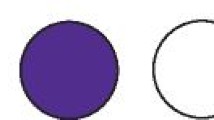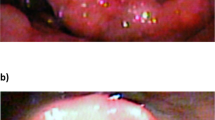Abstract
Data sources
Relevant data was sourced using the Cochrane Oral Health Group Trials Register, Cochrane Central Register of Controlled Trials, Medline, Embase, CINAHL, CANCERLIT, SIGLE and LILACS. Searching by hand was also carried out, reference lists checked for further trials, and authors and known specialists in the field contacted to try to identify any additional published or unpublished trials.
Study selection
Randomised controlled trials that concerned treatment or prophylaxis of orofacial lesions [caused by herpes simplex virus (HSV)] in adults, children (or both) who were immunocompromised because of cancer were eligible for inclusion. Outcomes of interest were presence/ absence of clinical/ culture-positive HSV infections (prevention), time to complete healing of lesions (treatment), duration of viral shedding, recurrence of lesions, relief of pain, amount of analgesia, duration of hospital stay, cost of oral care, patient quality of life, and adverse effects. The reports obtained from the electronic and other forms of searches were assessed independently by the review authors. Disagreements were resolved by discussion and reasons recorded.
Data extraction and synthesis
Authors were contacted for details of randomisation, blindness and sample demographics. Quality assessment was carried out on randomisation, blindness, withdrawals and selective reporting. The Cochrane Collaborations statistical guidelines were followed and risk ratio values were calculated using random effects models.
Results
In the 17 trials, three interventions were studied: use of aciclovir, valaciclovir and prostaglandin E. No trials reported on duration of hospital stay, amount of analgesia or patient quality of life. In the placebo-controlled trials, aciclovir was found to be effective for prevention and treatment. In comparisons of active interventions, there is no evidence of a significant difference in efficacy between valaciclovir and aciclovir, or higher doses of valaciclovir and lower doses. In the single study assessing the effectiveness of prostaglandin E for prevention, this intervention was less effective than placebo. No adverse effects were reported.
Conclusions
There is evidence that aciclovir is effective at preventing and treating HSV infections. There is no evidence that valaciclovir is more efficacious than aciclovir, or that a high dose of valaciclovir is better than a low dose of valaciclovir. There is evidence that, as a prophylaxis, placebo is more efficacious than prostaglandin E. In all included trials the risk of bias was unclear.
Similar content being viewed by others
Commentary
HSV is one of the most widespread infections of the orofacial region. Primary HSV infections often gives rise to only mild symptoms, particularly in healthy young children, but can be more symptomatic in adults. In the 20–40% of HSV-seropositive individuals who develop secondary HSV infection as a result of the reactivation of the virus in the sensory ganglion, the oral features vary greatly in severity. Immunocompromised patients tend to suffer more extensive, aggressive and atypical recurrences of HSV infections, with more painful lesions that take longer to heal than in immunocompetent individuals.1 Aciclovir and the newer antivirals such as valciclovir, famciclovir and penciclovir are normally used in the management of HSV infections.2
This review examines the evidence for the effects of different preventative and treatment strategies used in the management of HSV infections in individuals who are immunocompromised as a result of cancer treatment. The outcomes evaluated were described well and included clinical and laboratory evidence of HSV in this population, as well as duration of lesions, pain relief and quality of life assessments.
The authors state the objectives clearly, examining the literature to establish the difference between the proportion of patients who develop culture-positive HSV lesions and the proportion of patients achieving complete healing of HSV lesions during cancer treatment. A comprehensive search of eight electronic databases and handsearching was undertaken. The process of review and quality assessment of the identified trials was described in detail and was undertaken independently by two of the review authors in accordance with the Cochrane Handbook for Systematic Reviews of Interventions (www.cochrane-handbook.org/). Only 17 out of the 40 trial identified in the search were included this review.
The authors provide a descriptive summary of the findings as well as tabulated summary data of the characteristics of both included and excluded studies. Two trials evaluated treatment of HSV and 15 examined the effectiveness of intervention. The authors concluded that there was significant evidence of the efficacy of aciclovir compared with placebo in the prevention of HSV in these patients. They could not, however, establish significant differences between aciclovir and valciclovir or between different doses of valciclovir. Placebo appeared more effective than prostaglandin E. No reports assessed quality of life or the quantity of analgesia required. The authors cautioned the reader of the uncertain risk of bias in the studies included and highlighted the weak evidence comparing aciclovir and valciclovir, because the conclusion was based on only two studies.
Practice points
-
There is some evidence that aciclovir may be beneficial in both prevention and treatment of HSV in both adult patients and children undergoing cancer treatment. As these patients are known to suffer more prolonged and painful episodes of orofacial HSV than immunocompetent patients, the clinician is advised to consider prophylaxis in this group of patients.
References
Arduino PG, Porter SR . Herpes simplex virus type 1 infection: overview on relevant clinico-pathological features. J Oral Pathol Med 2008; 37: 107–121.
Woo S-B, Challacombe SJ . Management of recurrent oral herpes simplex infections. Oral Surg Oral Med Oral Pathol Oral Radiol Endod 2007; 103 (suppl. 12): S12.e1–S12.e18.
Author information
Authors and Affiliations
Additional information
Address for correspondence: Anne-Marie Glenny, Cochrane Oral Health Group, MANDEC, School of Dentistry, University of Manchester, Higher Cambridge Street, Manchester M15 6FH, UK. E-mail: a.glenny@manchester.ac.uk
This paper is based on a Cochrane Review published in The Cochrane Library 2009, Issue 2 (see www.thecochranelibrary.com for information). Cochrane Reviews are regularly updated as new evidence emerges and in response to feedback, and The Cochrane Library should be consulted for the most recent version of the review
Glenny AM, Fernandez Mauleffinch LM, Pavitt S, Walsh T. Interventions for the prevention and treatment of herpes simplex virus in patients being treated for cancer. Cochrane Database Syst Rev 2009; issue 1
Rights and permissions
About this article
Cite this article
Nolan, A. Interventions for prevention and treatment of herpes simplex virus in cancer patients. Evid Based Dent 10, 116–117 (2009). https://doi.org/10.1038/sj.ebd.6400689
Published:
Issue Date:
DOI: https://doi.org/10.1038/sj.ebd.6400689



